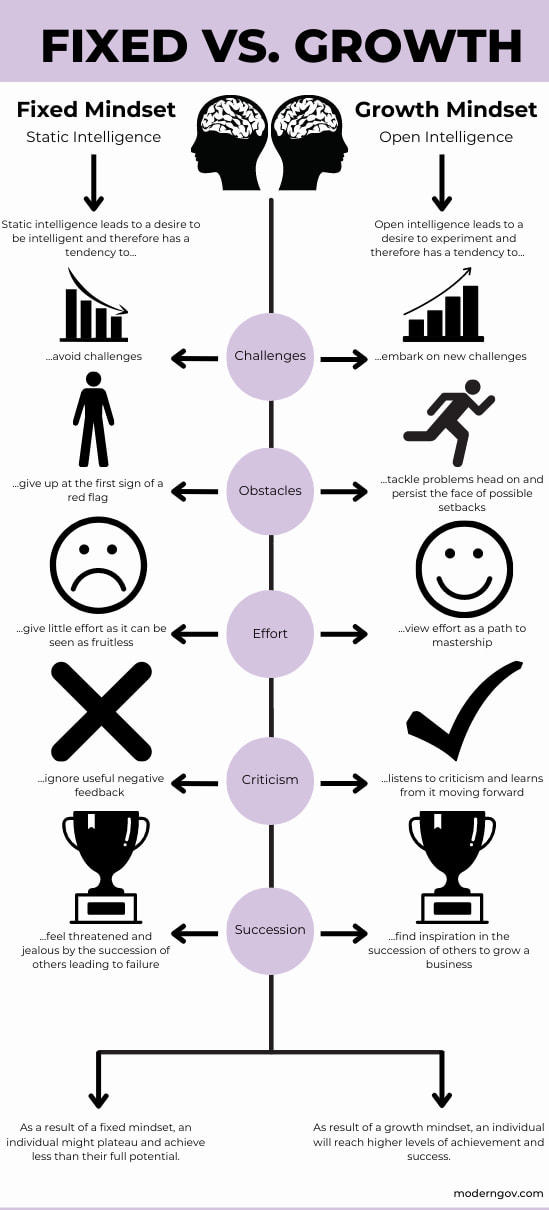Fixed vs. Growth Mindset | Differences and Examples
 Chloe Martin
·
5 minute read
Chloe Martin
·
5 minute read
Both personal and professional growth have always involved pushing through difficult times, exploring new opportunities, failing at times and learning from mistakes. This is known as having a "growth" mindset.
In this post, we'll cover what a growth mindset is, what it means to have one in the workplace, and how you can switch from a fixed to a growth mindset with workplace examples. Read on for more.
Contents:
- What is the Difference Between a Fixed and Growth Mindset?
- Can a Fixed Mindset Negatively Impact Your Team?
- Examples of a Fixed Mindset vs. Growth Mindset in the Workplace
-
How to Build a Growth Mindset From a Fixed One - 10 Top Tips
What is Meant by a Fixed and Growth Mindset?
A "fixed" mindset reflects an individual whose character, intelligence and personality are static resulting in a lack of effort and a plateau in their career with no path to success.
Also known as 'static intelligence', a fixed mindset leads to a desire to be intelligent and therefore has the tendency to avoid challenges, and give up at the first sign of a red flag. Those with a fixed mindset will often input little effort, ignore useful negative feedback and feel threatened by the succession of others leading to failure.
Whereas, a "growth" mindset portrays an individual who enjoys learning new skills, seeks out situations to explore and views failure as an opportunity to grow and succeed.
Also known as 'open intelligence', a growth mindset leads to a desire to experiment and therefore has a tendency to embark on new challenges. In the workplace, those will a growth mindset tend to tackle problems head-on, view effort as a path to progress, listen to criticism and find inspiration in the succession of others.
Why is a Growth Mindset Important?
Individuals with a growth mindset are more likely to embrace challenges that come their way, be resilient in the face of failure, be open to learning and put egos to one side. Those with a growth mindset look to learn new skills in their own time and use setbacks as learning experiences instead of seeing them as permanent hindrances to progress.
Not only is having a growth mindset beneficial to you, but it's also good news for your organisation. Having employees with a growth mindset improves problem-solving abilities, encourages continuous improvement and means they will seek out their own opportunities for skill enhancement - instead of always waiting for training that's mandatory.
Can a Fixed Mindset Negatively Impact Your Team?
As a matter of fact, yes. Mindset is key for all teams, and it's up to managers and team members to work together to produce the best outcomes. There are a number of implications of having a fixed mindset in your organisation, including:
- Resistance to change: Individuals with a fixed mindset are more likely to resist new processes, strategies or technologies as they fear they lack the skills to succeed.
- Fear of failure: Fixed mindset individuals fear exposing their limitations which means they will avoid taking risks of any kind - this can impact growth and innovation in that team or department.
- Limited adaptability: If fixed mindset individuals work in an organisation or sector that's always changing, they may find it difficult to adapt to changing conditions and pivot.
Examples of a Fixed vs. Growth Mindset in the Workplace
As you may have guessed, a fixed mindset is likely to leave you stuck in the workplace, whereas a growth mindset can help take you to new levels and achieve higher levels of success. Let's explore this further with examples.
Learning Something New in the Workplace
- Fixed Mindset: If I don't try something new then I won't fail and feel embarrassed.
- Growth Mindset: Everyone makes mistakes and these mistakes are an opportunity to succeed the next time.
Comparison in the Workplace
- Fixed Mindset: They only got that promotion because they're naturally smart and didn't need to try hard.
- Growth Mindset: No one is born smart and everyone can improve over time with persistence, effort and an open mind. Maybe I can speak to that person to ask for advice or tips on how to get there.
Self-improvement in the Workplace
- Fixed Mindset: I'm too shy to speak up in meetings and worried my answers will be wrong.
- Growth Mindset: I can become more confident and improve my public speaking skills with practice and advice.
Now you can compare these examples, it should be clear that a fixed mindset will most likely result in an individual learning or achieving less than their potential and a growth mindset will allow an individual to achieve higher levels of success.
How to Build a Growth Mindset From a Fixed One - 10 Top Tips
1. Learn something new
Whether it's for your job or in your personal life, try to take yourself out of your comfort zone and take the time to learn something new. Learning something can be daunting, but try to think about the benefits and feeling of reward that come with it.
2. Understand that it's okay to make mistakes
At the end of the day, we're all human and one of the best ways to learn is from failure. This might send a chill up your spine but mistakes are an opportunity to improve and learn about ourselves. Even celebrities or those in your industry will have gone through failures or mistakes, but that's what got them to where they are.
For some inspiration, think about Richard Branson. He launched 400 companies before founding Virgin Galactic, which is out of this world - quite literally now with the space launches! Or think about the famous American film director, Steven Spielberg. He was rejected by the University of Southern California Film School 3 times, only to eventually attend another school, drop out and become one of the most famous directors of all time.
3. The power of little changes
Change can be daunting, but things are bound to change from time to time whether you want them to or not - so you may as well try to get comfortable with change. A Harvard Business School survey showed that 71% of 1,500 executives from more than 90 countries said adaptability was the most important quality they look for in a leader.
4. Set Clear Goals
It's difficult to stay persistent when trying something new or making consistent changes, so set clear goals to outline what you specifically want to achieve. These will give you something to work towards and act as motivation to keep going.
5. Look at how you want to improve
Although there may be a set of skills you need to develop to gain a promotion or meet new responsibilities in your role, it's equally as important to think about what you personally want to get better at. Carol Dweck, an American Psychologist, is known for her work on developing mindsets, and in this video, she talks about knowing where you want to improve and believing you can is key.
6. Ask for feedback
One of the best ways to develop an open mind is to ask for feedback to see where you can improve. The feedback from others will give you insights into areas that you may not have thought of or points you may have already developed but don't see in your day-to-day - for example on specific projects.
7. Surround yourself with others who have a growth mindset
This can be a tricky one, especially if you're only just starting to notice what a fixed and growth mindset looks like in yourself, let alone other people. But, take the time to see how others talk about themselves or react to challenges and you'll see the difference. Engaging with people who have a growth mindset can positively influence your own mindset and you may even bond over your experience and journey.
8. Remove negative self-talk
Your inner dialogue has a large impact on how you act and how you develop as a person. Pay attention to negative self-talk that reinforces your fixed mindset, for example, instead of saying "I can't do this," try saying "I haven't mastered this yet, but with effort, I can improve and learn more."
9. Embrace challenges
Seek out small challenges in your day-to-day life to push your boundaries and learn how to deal with different changes to develop your resilience. From taking up a new hobby to learning new skills, embracing challenges helps you get out of your comfort zone and develops your willingness to learn. You might even discover how much you enjoy a challenge!
10. Regonise Progress
Transitioning from a fixed to a growth mindset will be an ongoing process that takes time. Be patient with yourself and try not to get too disheartened if your old fixed mindset tendencies resurface on occasion. When they do, remind yourself of what you're working towards and remember where you started to see how you've grown.
Boost Confidence in the Workplace with our Training Courses
From developing your mindset to learning how to speak with impact in the workplace, our Confidence & Resilience training courses have something for everyone. Take a look and secure your place today.
2+ years in SEO and content marketing. Striving to help public sector professionals develop their skills and learn something new through high-quality content.







